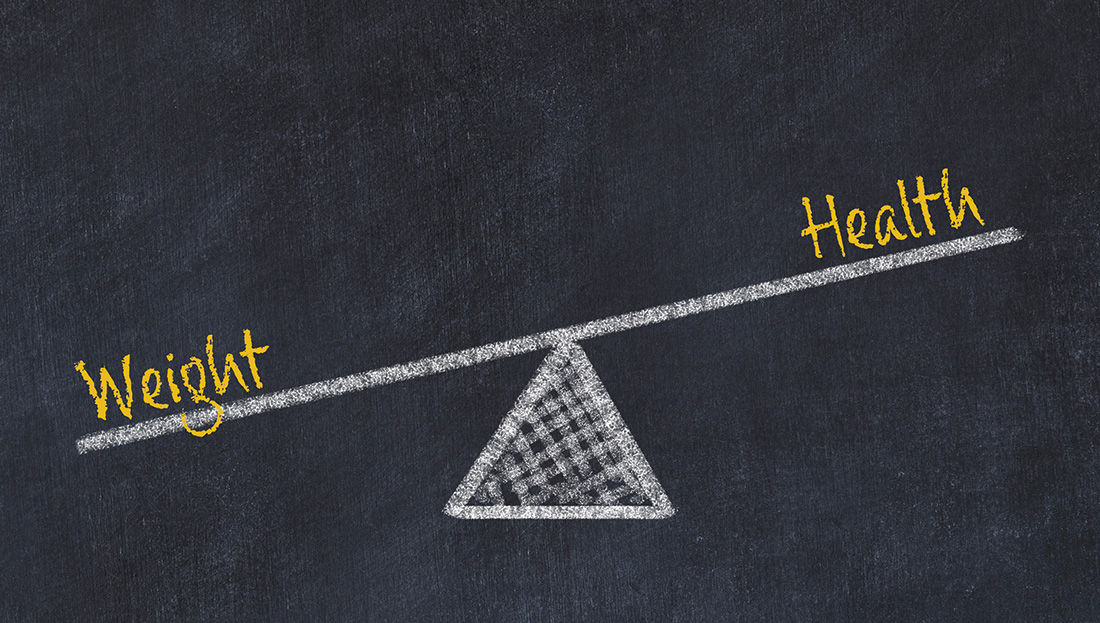
I’ve had the privilege of growing up alongside the fitness industry. From the time I was an exercise science undergrad in the late ‘80s, I’ve seen a lot of trends come and go, some of which were based on the best available science at the time. This includes the assertion that maintaining a healthy weight comes down to a simple equation of calories in versus calories out.
Today, we have more knowledge, diets, supplements, weight-loss medications, exercise gadgets and gear, gyms, and health and exercise professionals than at any other time in history. So why are more people living in larger bodies than ever before? According to the National Institutes of Health (NIH), the obesity rate in 1980 was 13.4%. Today it sits around 41.9%, per the Centers for Disease Control and Prevention (CDC).
What are we not getting right?
A Quick BMI History Lesson
Body mass index (BMI) has long been used to quickly assess one’s level of health risk based on a simple weight-to-height ratio. According to a 2015 review in Nutrition Today, the BMI equation was originally developed in 1835 by Lambert Adolphe Jacque Quetelet, a Flemish astronomer and statistician, but wasn’t widely adopted for practical use until the early 1990s. Prior to that, the traditional height-weight charts were developed by the Metropolitan Life Insurance Company. Here are some additional interesting points from the Nutrition Today review:
- The World Health Organization (WHO) adopted the use of BMI in the 1990s to determine health status, establishing four categories: underweight, normal, overweight and obese.
- In 1998, the NIH changed their weight categories to fall in line with the WHO’s, and instantaneously converted millions of Americans from having “normal weight” to having “overweight.”
- BMI has been shown to have a poor correlation with body mass. For example, in the National Health and Nutrition Examination Study (NHANES) III database, individuals with a BMI of 25 kg/m2 had body-fat percentages that ranged from 14% to 35% in men and 26% to 43% in women. In other words, people who fell at the high end of “normal” for BMI ranged from low-normal to obese in body-fat percentages.
Have Our Weight-loss Efforts Paid Off?
When I started my freelance writing career in 1998, one of my first articles was on alternative ways to gauge clients’ progress that did not include weighing or body-composition testing. Two sources I interviewed told me they require both baseline and subsequent weight and body-composition testing and that they wouldn’t take a client if they refused them. One even went so far as to compare these tests to pre-op testing.
I also interviewed potential clients to ask their opinion on these tests. Most respondents stated that they hated the tests, primarily because they were embarrassing and induced shame. “I don’t need someone pinching my fat to tell me I’m fat,” reported one woman. These same interviewees also said that these tests were demotivating.
Today, a quarter of a century later, it seems that many generally accepted practices and the advice given to those who fall outside “normal weight” categories haven’t really changed much. In fact, they may be causing more harm than good.
“When we’re pursuing intentional weight loss, 95% of the time it will end in weight gain and weight cycling two to five years after any initial weight loss,” asserts Ashley Wentworth, MS, RD, CD, owner of Ashley Wentworth Nutrition. “This means that dieting is actually a predictor of weight gain. And studies show that weight cycling is worse for our physical, mental and emotional health than staying in our current body size.”
Kristina Bruce, who holds a bachelor’s degree in health studies and is a certified life coach specializing in body acceptance in Toronto, Canada, agrees. “The common societal belief is that people just aren’t trying hard enough,” says Bruce, “and it’s the individual’s fault that they couldn’t keep it off. But so many of these people are intelligent, hard-working individuals who succeed in many other areas of life. So, can it really be that it’s just this one area of life they can’t get ‘right’?”
Bruce points to studies that have looked at The Biggest Loser contestants and concluded that the strategies employed by the show did damage to participants’ metabolisms and that the only effective way to keep the weight off was through a substantial increase in energy expenditure.
“How many people can realistically dedicate such a large amount of their time to this heightened energy expenditure?” asks Bruce. “And is this really a healthy lifestyle to promote? What about the increase in chronic stress that accompanies worrying about weight regain? We know that chronic stress negatively affects health, yet we overlook how the pressure to maintain weight is a form of chronic stress.”
That pressure leads many to go to extremes. “We’ve been pressured by media, health influencers, providers, the diet industry and health organizations to feel like we have to be participating in extremes, like cutting out added sugars, exercising excessively, participating in strict health challenges and more in order to make a true impact on our health,” argues Wentworth. “But the truth is, this all-or-nothing thinking about health is making us miserable and costing us our physical, mental and emotional health. Weight cycling results in inflammation in the body and may put us at greater risk for hypertension, insulin resistance, dyslipidemia, osteoporosis and increased mortality. Weight cycling may, in fact, be more of a risk factor for health conditions associated with obesity.”
Weight cycling can also have harmful psychological consequences. In a 2020 study published in PLoS One, researchers found a correlation between frequent weight cycling and depressive symptoms. They also found a link between weight stigma and weight cycling.
Weight stigma includes bias and discriminatory acts and attitudes toward an individual based on their weight or size, says Wentworth. “Weight stigma is often used to ‘motivate’ people to lose weight or encourage behavior change but the opposite is true—weight stigma induces stress, causes cortisol release and results in eating more, disordered eating behaviors, poor self-care, exercise avoidance and avoiding medical care to avoid stigmatization,” explains Wentworth. “Much of the research on weight stigma also suggests that the bias and discrimination folks are subjected to result in depression, low self-esteem and anxiety. Research shows that weight stigma is associated with the development of many health conditions thought to be obesity-related health conditions, regardless of adiposity.”
Much of the same applies to internalized weight stigma (IWS), which is the belief that negative stereotypes about weight apply to the self. It is a significant concern in women, as it has been linked with a range of physical and psychological issues, including disordered eating. A 2021 study in Cureus suggests that the prevalence of IWS is high in people who classify as having overweight and obesity and that there is a strong association between IWS and severe depression and anxiety.
The Weight–Health Connection
According to Bacon and Aphramore, while it’s true that many short-term weight-loss intervention studies do indicate improvements in health measures, the weight loss is always accompanied by a change in behavior. This poses the question: Are the improvements due to the weight loss or to the new health habits?
“Most research studies can only show us correlation—that two factors are related—and often cannot prove causation—that one factor causes another,” states Wentworth. “Much of the research done on weight loss and health impacts are short-term studies. There is no way of telling if the health improvements were sustained, and we cannot tell if the weight loss was the cause of the improvements in health markers or if it was actually the behavior change.
“A person cannot dictate their body to lose weight,” says Santo Coleman, Ph.D., assistant professor of health sciences at James Madison University. “This fact does not remove a person’s agency. If a person has a healthy relationship with food, exercise, and sleep, and lives in an environment that is conducive to a positive relationship with these behaviors, then in most cases, they will achieve a healthy weight status without the need for medical intervention. Weight loss should not be a goal but seen as a side effect of healthy living.”
In a research review published in 2021 by Gaesser and Angadi, the study authors remind readers that there is plenty of evidence that suggests that physical activity is more important than weight loss when it comes to health; we can increase physical activity and experience health improvements without weight loss. Because of this and several other points, the authors propose a weight-neutral approach to “obesity treatment.”
We also know that other areas of life affect both health and weight, including chronic stress and sleep quality and quantity. With this in mind, Bruce and others argue that there are better ways to focus on improved health that don’t require focusing on changing body size.
A Challenge to Health and Exercise Professionals
What if health and exercise professionals stopped focusing on and promising weight loss with their clients and instead focused on the areas that affect health—nutrition, physical activity, sleep quality and quantity, stress, and known medical conditions?
What if we coached clients toward body acceptance and appreciation and helped them pivot their focus onto these same areas that influence health—areas in which true goals can be set—and their bodies found their natural size and shape?
What if we helped clients identify their whys—their reasons for change—that have nothing to do with weight loss? Ask them questions such as: How will being stronger and having more stamina improve your life? Why do you want to lower your blood pressure and cholesterol levels? How will easing your struggle with depression help your relationships?
Their answers may surprise you—and them.
Expand Your Knowledge
 |
What does struggling with overweight or obesity feel like? What thoughts occupy the minds of individuals trying to manage their weight? Each client is multi-dimensional, and it's important your approach to weight management is, too. As an ACE Weight Management Specialist, you will learn to coach with empathy and develop skills to support your clients' goals, leading them to meaningful change.
|
 |
For many clients, maintaining their weight can be a challenging prospect—but you can make a difference. With the Coaching Strategies for Long-term Weight Management course bundle, you will learn to coach with empathy and develop skills to support your clients' goals, leading them to meaningful, long-term change.
|
 |
In this 2-hour video training, you’ll learn a habit-based approach built for individuals impacted by busy and stressful lives. This course presents tools built from evidence on the psychology of change, including how to leverage identity, Precision Nutrition’s “goals-skills-practices-actions” framework and how to build a growth mindset in clients.
|





 by
by 





